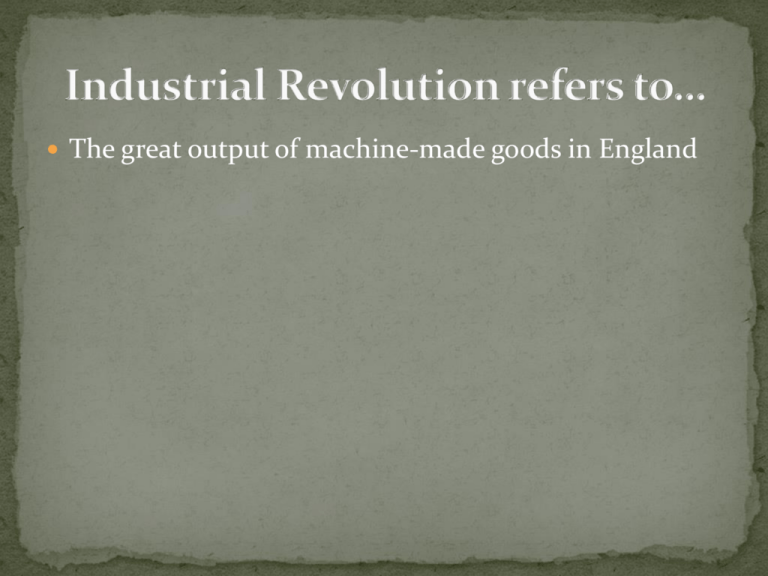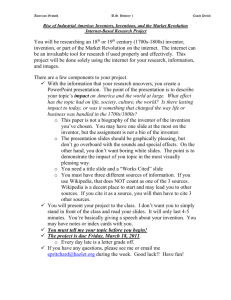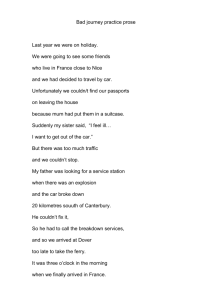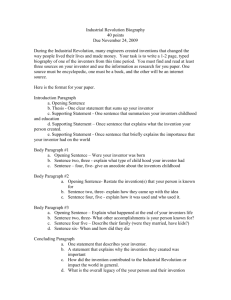File
advertisement

The great output of machine-made goods in England Enclosures fenced in farms Landowners experimented with new agricultural methods Smaller farmers couldn’t compete with larger farm owners so they gave up farming and moved to the city Charles Townshed came up with a 4 year crop rotation cycle Helps replenish the nutrients in the soil Natural Resources Water power Iron ore to construct machines Rivers for transportation Harbors which merchant ships can sail from Business people invested in new machines Banks gave out loans to people starting new businesses England had many overseas colonies and could sell new products to the colonies Large labor force Inventor Invention Importance James Hargreaves Spinning Wheel Spin 8 threads at a time Samuel Crompton Spinning Mule Thread was stronger and finer Eli Whitney Cotton Gin Made production faster Inventor Invention Importance James Watt Steam engine More output Robert Fulton Steam engine (water travel) Improved water travel John McAdam Roadbeds Allowed easy travel even in rainy weather Inventor Invention Importance George Stephenson First railroad line Ran 27 miles Importance of Railroads 1) Helped manufacturing – cheap way to transport goods 2) New jobs were created 3) England’s agricultural and fishing industries boomed (easy transport) 4) Country people could now take distant city jobs During the War of 1812, Britain: placed a blockade around the US to keep the US from international trade forcing the US to look inward for independent industries. Britain didn’t allow engineers, mechanics, and toolmakers to leave the country. Why? They didn’t want their ideas to spread (more $$ for them) Samuel Slater: English mill work; went to the US and built a spinning machine from memory and a partial diagram. Slater’s Mill in Pawtucket, RI Moses Brown: opened first factory in RI What were conditions like for the mill girls? Worked over 12 hours/day, 6 days a week; were watched inside and outside of work 1) Belgium carpenter went to Belgium (from England) and built spinning machines 2) Germany railroads were built “Laissez-faire” means: “let do” – “let people do as they please” Government shouldn’t interfere with business. Adam Smith: wrote The Wealth of Nations – he said that economic freedom leads to economic progress Capitalism: money invested in business with the goal of making $$ Utilitarianism: greatest good for the greatest number Jeremy Bentham: came up with the idea of Utilitarianism Characteristics of Socialism: 1) Factors of production are owned by the public 2) Government should plan (be involved) in the economy 3) Belief in progress and concern for social justice (helping the less fortunate) Communism: ALL factors of production are owned by the people Karl Marx: father of communism Characteristics of Communism: 1) property is owned by the people (managed by the gov’t) 2) all goods and services would be shared equally Urbanization: City building and people moving to cities London: (capital of England) Europe’s largest city—1 million people by 1800 Living Conditions 1) Lacked adequate housing, education, police 2) Unpaved streets, no drains, heaps of garbage 3) Multiple families lived in small apartments 4) Sickness was widespread Owners of the factories and mines Upper Class Upper Middle Class • Factory supervisors , toolmakers, mechanical drafters Gov’t employees, doctors, lawyers Lower Middle Class Working Class • No improvements in life • Machines replaced them Benefit of child labor? Little hands, cheap labor Union: workers get together as a group and try to improve work conditions and/or pay. Strike: workers refuse to work until their demands are met For years, Britain did what? Denied workers the right to form a unionthreat to social order and stability Factory Act of 1833 1) Illegal for 9 year olds and under to work 2) 10-12 year olds couldn’t work more than 8 hrs/day 3) 13-17 year olds couldn’t work more than 10 hrs/day Ten Hours Act: women and kids couldn’t work more than 10 hours a day Women: earned more money in factories than those women who stayed home…but earned less than men







